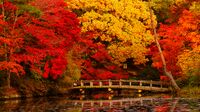Askali: Difference between revisions
PallasAthena (talk | contribs) |
PallasAthena (talk | contribs) |
||
| Line 75: | Line 75: | ||
=== The Askali Empire (1638-1934) === | === The Askali Empire (1638-1934) === | ||
The defender of the faith eventually became the sole power in the country's government, and the monks turned again to isolation. The new government modernized the military, moved the capital to Sogumi and built a new power base there, centralizing the government, and financed colonial ventures across the world to acquire valuable goods such as tea, nutmeg, and pepper for sale domestically and in Miras for even higher profits. The country became a strong naval power, and was at its height in the 19th century, when Askali's industrialization reached its peak, its population grew, its technological capacity and innovation increased, and its Romantic era cultural output was famed worldwide. | |||
=== War and the Socialist Republic (1934–present) === | === War and the Socialist Republic (1934–present) === | ||
Eventually, the cost of maintaining the colonies and protecting them against attack and uprising proved too much, and the government defaulted on its debt in 1934. This caused the 'zaibatsu', corporations driving the war and economic engine to fail. Mass strikes led to government repression, which led to revolution. After a brutal civil war, the socialist faction was victorious, nationalized key industries, expelled or killed the zaibatsu families, and began a campaign of re-industrialization and government education to train the workforce required for an advanced economy. | |||
== Politics == | == Politics == | ||
Revision as of 05:17, 13 April 2020
This article is incomplete because it is pending further input from participants, or it is a work-in-progress by one author. Please comment on this article's talk page to share your input, comments and questions. Note: To contribute to this article, you may need to seek help from the author(s) of this page. |
Askali Socialist Republic | |
|---|---|
| Capital and largest city | Sogumi |
| Recognised national languages | Askali |
| Ethnic groups | Askali >99.9% |
| Demonym(s) | Askali |
| Government | Unitary Socialist hybrid regime |
| Legislature | The Senate (also the High Court and body that appoints executive officials) |
| Establishment | |
• Askali Empire | 1638-1934 |
• Askali Socialist Republic | 1949- |
| Area | |
• Total | 1,174,510 km2 (453,480 sq mi) |
| Population | |
• 2020 census | 40,325,928 |
• Density | 34.33/km2 (88.9/sq mi) |
| GDP (nominal) | 2019 estimate |
• Total | $949,086,344,792 |
• Per capita | $23,535 |
| Gini | 0.19 low |
| Driving side | left |
Askali is a country in the cool temperate latitudes of the Northeastern continent, Kula. It is situated between the high Askali Alps to the east and the ocean separating it from Miras to the west. Askali is the home of the Matraist faith, and was historically notable for its former colonial empire. In the present day, Askali is a Socialist State which retains significant naval capacity.
Etymology
Askali comes from a descriptive word in the country's ancient speech meaning "beside the sea".
Geography
Askali's geography is dominated by the powerful forces of glaciation and volcanism that have shaped the country. To the West, the crust of the ocean subducts beneath the country, crumpling the surface near Askali and raising its spectacular mountains to almost 6 km in height. Meanwhile, the melting of the crust generates volcanic activity which is very frequent. Earthquakes are too, and the subduction zone near Askali is one of the longest and most powerful in the world, capable of generating Earthquakes such as the M 9.0 that struck the country in 1788. Almost all of the country except for the small coastal plains and river valleys is rugged mountainous terrain unsuitable for habitation.
Climate
Cool and Temperate, Askali summers struggle to warm above 20 C even in the south, and winter temperatures are low enough for snowfall across the entire country, but winter temperatures are also relatively mild and are rarely below -10 C except in the north and in the mountains. The entire country is extremely rainy, cloudy, and foggy. For example, The capital Sogumi receives 80 inches of rain a year, but most coastal locations receive over 150 inches of rain, and most places are overcast 75%-80% of the days out of the year. Askali is famed for its four seasons, a brief mild and green summer, a stunning fall where the country's old growth deciduous forests become gold and red, a windy, snowy winters where the sun often rises later than 9:00, and wet, mild springs. The far north is entirely different however, its extreme northern latitude means that the outlying islands are snowbound year-round.
Environment
Askali is dominated by forests; 95% of the country is covered by woods home to a variety of deciduous (Beech, Maple, etc) and a few coniferous species like Sitka Spruces. The country has rich fishing grounds due to the mixing of cold and warm waters off its coast. It is also notable for the relatively large continental ice fields in the high Askali alps. The national animal of Askali is the wolf.
History
Ancient History
Early on the the present era, the cultivation of rice and barley began in Southern Askali, most of Askali's civilization is still centered here since Southern Askali is the limit for rice cultivation. Small villages grew into early feudal divisions protected by mercenary warriors. Most people were smallholding farmers.
Rise of Matraism and the Crusaders
Matraism was a reaction to the moral ills of the early feudalistic society, and increasing strife and famine following population growth. The Matraist hermit monk masters, called the shadowed masters preached detachment from the material world to realize the true nature of reality. The monastic orders they established eventually became the most powerful organizations in society and organized crusades to conquer the country's north and convert them. Following this, they turned outward, periodically attacking as far as Miras. Eventually social strife required the monks appoint a defender of the faith out of the lay members of society to assist in administration.
The Askali Empire (1638-1934)
The defender of the faith eventually became the sole power in the country's government, and the monks turned again to isolation. The new government modernized the military, moved the capital to Sogumi and built a new power base there, centralizing the government, and financed colonial ventures across the world to acquire valuable goods such as tea, nutmeg, and pepper for sale domestically and in Miras for even higher profits. The country became a strong naval power, and was at its height in the 19th century, when Askali's industrialization reached its peak, its population grew, its technological capacity and innovation increased, and its Romantic era cultural output was famed worldwide.
War and the Socialist Republic (1934–present)
Eventually, the cost of maintaining the colonies and protecting them against attack and uprising proved too much, and the government defaulted on its debt in 1934. This caused the 'zaibatsu', corporations driving the war and economic engine to fail. Mass strikes led to government repression, which led to revolution. After a brutal civil war, the socialist faction was victorious, nationalized key industries, expelled or killed the zaibatsu families, and began a campaign of re-industrialization and government education to train the workforce required for an advanced economy.
Politics
The Senate and The Departments
Foreign relations
Military
Economy
Demographics
Ethnic groups
Virtually everyone in Askali is Askali themselves. Immigration to the country is difficult and almost non-existent.
Major cities
Sogumi and the area around it is home to a majority of the population. The north is extremely sparsely populated, and 90% of the country is forested.
Language
Askali is a language isolate with SOV word order, Ergative alignment, and complicated verbal and nominal morphology including spatial cases, verb compounding, and noun incorporation.
Religion
Matraism is the official faith of Askali, certain foreign religions classified as 'cults' are heavily persecuted.
Health
Education
Culture
Art
Architecture
Literature
Philosophy
Music
Romantic Era composition in Askali is world-renowned, the symphonies and operas of Anatela Sagadeli, Chesko Noguvera, and others are among the global canon of classical music.
Cinema
Fashion
Media
Society
Cuisine
Sports




